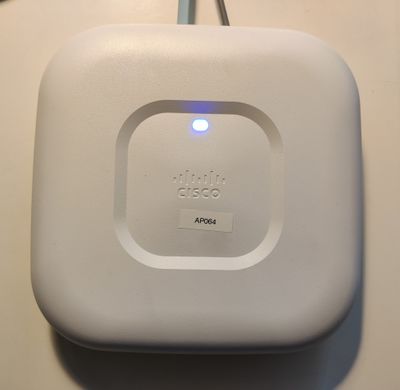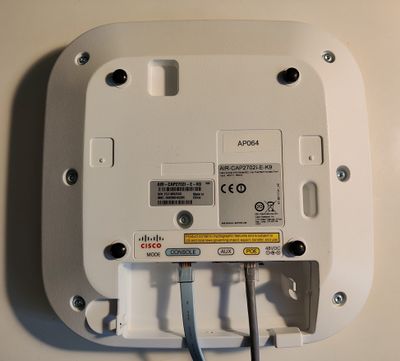Cisco Air-CAP-2702O-E-K9
Contents
Specifications
Vendor: Cisco
Model: Aironet 2700 Series 802.11ac Dual Band Access Point
Part Number: AIR-CAP2702I-E-K9 v03
System Memory:
- 512 MB DRAM
- 64 MB flash
Power Draw: 15W
Interfaces:
- 2x10/100/1000BASE-T autosensing (RJ-45)
- Management console port (RJ-45)
CPU: PowerPC CPU at 800Mhz, revision number 0x2151 with 376814K/134656K bytes of memory
Console: 9600 8N1, Hardware Flow Control = no, Software Flow Control = no
Entering ROMMON Mode
ROMmon (ROM Monitor) is a bootstrap program that initializes the hardware and boots the Cisco IOS XE software when you power on or reload a router or other device. If your device does not find a valid system image to load when it is booting, the system enters the ROMMON mode.
- Keep the MODE button pressed while providing the device with power until the LED blinks RED.
Reset Factory Default
- Enter ROMMON mode
ap: delete flash:/private-multiple-fs Are you sure you want to delete "flash:/private-multiple-fs" (y/n)?y File "flash:/private-multiple-fs" deleted ap: reset Are you sure you want to reset the system (y/n)?y System resetting...
Switch to Standalone Mode
The Aironets support two modes of operations: Autonomous and Lightweight.
The Lightweight mode is for operating with a central controller, thus not requiring extra components (like a webserver for configuring the device through a webinterface).
The Autonomous mode is a full-blown image with all the necessary stuff to manage the device by itself.
We first need to delete all previously install images as they will make it difficult to boot from the correct firmware image.
Delete all previous images
Boot normally on the device (if you do not have access, perform the Factory Reset, the default credentials will be Cisco:Cisco).
Once logged in, look for traces of the current firmware, will typically look something like ap3g2-rcvk9w8-mx or ap3g2-k9w8-mx.153-3.JA10:
APd46d.50fa.02bc>en
Password: (Cisco)
Directory of flash:/
2 -rwx 269 Jan 1 1970 00:11:45 +00:00 info
3 -rwx 54810 Jan 6 2020 05:37:36 +00:00 event.log
39 drwx 576 Mar 1 1993 00:05:54 +00:00 ap3g2-rcvk9w8-mx
4 -rwx 0 Mar 1 1993 00:00:34 +00:00 config.txt
5 -rwx 140 Mar 1 1993 00:00:16 +00:00 env_vars
37 -rwx 64 Jan 6 2020 05:37:28 +00:00 sensord_CSPRNG0
15 drwx 2176 Oct 18 2016 12:18:57 +00:00 ap3g2-k9w8-mx.153-3.JA10
71 drwx 320 Mar 1 1993 00:00:15 +00:00 configs
78 -rwx 59679 May 3 2019 07:57:51 +00:00 event.capwap
73 -rwx 64 Jan 6 2020 05:37:28 +00:00 sensord_CSPRNG1
8 -rwx 0 Oct 20 2016 11:17:59 +00:00 ce
7 -rwx 129753 Mar 15 2018 15:03:21 +00:00 event.r1
6 -rwx 1048 Mar 1 1993 00:00:20 +00:00 private-multiple-fs
11 -rwx 128014 Dec 8 2015 19:59:53 +00:00 event.r0
84 -rwx 74 Mar 3 2020 17:59:32 +00:00 capwap-saved-config-bak
87 -rwx 95008 Jun 25 2019 10:26:52 +00:00 lwapp_reap.cfg.bak
APd46d.50fa.02bc# delete /recursive /force flash:/ap3g2-rcvk9w8-mx
APd46d.50fa.02bc# delete /recursive /force flash:/ap3g2-k9w8-mx.153-3.JA10
Switch to Autonomous Mode
- Prepare a TFTP Server
- The Cisco device will by default use 10.0.0.1 for its IP, therefore, its recommended that you use 10.0.0.10, but it's not necessary as we can force the device to connect to a specific address.
- The device will expect your firmware tarball to be named something like: "ap3g2-k9w7-tar.default" in your TFTP server root directory. So if your firmware file is called ap3g2-k9w7-tar.153-3.JPI4.tar, replace everything that comes after the first .tar with .tar.default.

